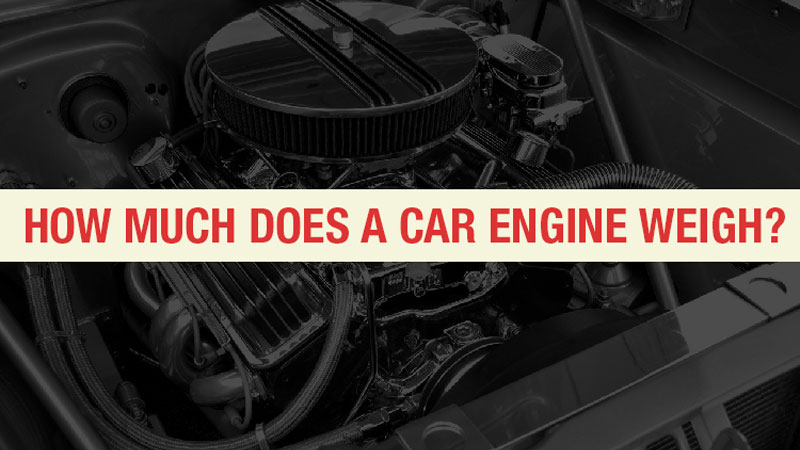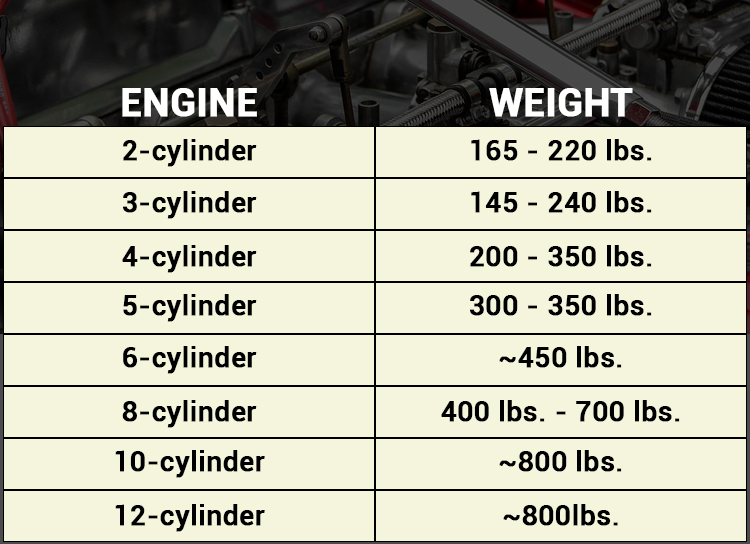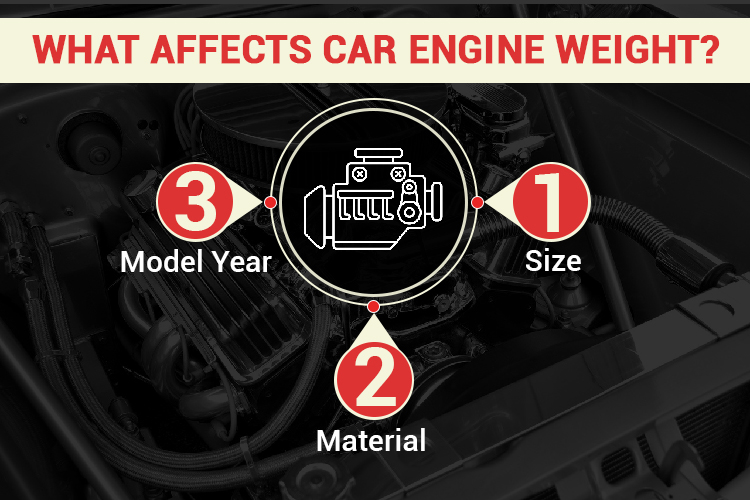Want to know whether your engine’s weight affects your vehicle’s performance, fuel efficiency, or longevity?
Automobile technology has been in constant evolution over the decades. Among the components of any newly released vehicle, the engine always attracts the biggest interest and attention.
Oftentimes, automotive enthusiasts would discuss and argue about the new engine’s torque rating, horsepower, speed, and fuel consumption among other factors. However, nobody would seem to care about its weight.
So, in this guide, I’ll address some common questions that people have about engine mass. Do bigger engines have better longevity? What are the determinants of engine weight? Read on to find out.
How Much Does a Car Engine Weigh?
Two-Cylinder Engine
A combustion system containing just two cylinders might sound strange nowadays. Nonetheless, this kind of engine usually weighs 165-220 lbs. Cars like the Volkswagen XL Sport, the 2014 Alfa Romeo Mito, and the Honda N600 have 2-cylinder engines.
Three-Cylinder Engine
A three-cylinder engine can weigh between 145-240 lbs., similar to two-cylinder variants. However, Ford produced an 88-pound, 3-cylinder, 400-hp tiny turbocharged Ecoboost engine. Nissan’s Batmobilesque ZEOD RC uses this propulsion machine.
Four-Cylinder Engine
A four-cylinder aluminum block engine will weigh 200 to 350 lbs. If it’s a cast-iron variant, expect it to be heavier.
Five-Cylinder Engine
Typical 5-cylinder engines weigh 300 to 350 lbs. European products like Audi and Volvo have five-cylinder engines.
Six-Cylinder Engine
Six-cylinder engines usually measure 450 lbs. or less. Minivans, sedans, and SUVs usually have six-cylinder engines.
Eight (and Above) Cylinder Engine
The average eight-cylinder engine weighs between 400 and 700 lbs. Higher-end luxury vehicles and sports cars have this kind of combustion system. Furthermore, 10 and 12-cylinder engines weigh more than 800 lbs.
Diesel vs. Gasoline Engine Weight
Typically, Diesel engines are heavier than their gasoline counterparts. They work based on the principle of compression ignition. The combustion process within a gasoline engine is smooth and controlled compared to that of a diesel engine. Diesel-powered systems need a dense and robust structure to cope with noise and vibration.
Consequently, diesel engines have a high compression ratio (usually twice that of gas engines). Therefore, to sustain this pressure, they need a very thick and heavy block.
Also, note that diesel fuel has larger and denser molecules compared to gas. A gallon of gasoline weighs 6.3 lbs. while that of diesel comes in at 7.1 lbs. Overall, this factor also contributes to the bulkier mass of diesel combustion systems.
Which Factors Affect Car Engine Weight?
The main elements that determine engine weight are size/displacement, model release year, and the construction material used. I will discuss these factors in detail below.
Size
Size is the most important determinant of car engine weight. This size is also commonly referred to as “engine displacement” or “engine capacity”. It is the total volume occupied by the cylinders with a vehicle’s internal combustion system.
A larger size or displacement means greater engine weight. It also indicates that there is more space for air and fuel ignition.
Automobile manufacturers are trying to squeeze more power from smaller engines. Due to hybrid technology and turbocharging, some engines have become smaller and more powerful.
Material
The material used in designing an engine also has a significant effect on its weight. An aluminum block engine will be much lighter compared to a similar motor made from cast iron.
Furthermore, old models of almost every engine tend to be heavier compared to newer releases. This fact is because most of them are constructed from cast iron.
For example, the Mercedes V8 single overhead cam aluminum block weighs 450lbs. On the other hand, its cast-iron block variant stands at 550 lbs.
Model Year
An engine’s release year also determines its weight. Newer engines are more technologically advanced compared to their older counterparts. Automobile design specialists have downsized many components in more recent internal combustion systems.
Generally, this improvement has given way for smaller engine sizes. Also, over the decades, the increasing cost of gasoline, global warming, CO2 emission concerns, and government policies have stimulated the production of smaller engines.
Conversely, a handful of new engines have a higher weight due to the introduction of additional sensors, accessories, and modifications.
Do Heavier Engines Last Longer?
There is no evidence that weightier engines last longer. Research hasn’t indicated any positive correlation between engine size and longevity. Your vehicle brand, maintenance culture, and driving habits have more effect on your engine’s lifespan.
For example, when comparing three of Dodge’s engines – 5.7 Hemi, 6.4 Hemi, and 5.9 Magnum, both Hemi engines are lighter than the Magnum one but they can last longer than the 5.9 Magnum.
Precision manufacturing and quality engineering also determine engine lifespan. Nevertheless, larger engines can do less work to produce significant energy due to their greater displacement. But bear in mind that a bigger internal combustion system has poorer fuel efficiency.
Also, you must match an engine in a proportionate manner to the vehicle you want to drive. If your engine size is too small for your vehicle, there will be less efficient power transmission.
The engine might have to work twice as hard to move your vehicle. If the reverse is the case, fuel efficiency won’t be good. However, Ford, a top-notch manufacturer uses turbocharging to release more power from smaller engines with optimized fuel consumption.
See Also – 4 Symptoms of Bad Motor Mounts
Does the Engine’s Weight Affect the Vehicle’s Performance?
Engine weight is not really an absolute determinant of a vehicle’s performance. Rather, the power to weight ratio is a better estimator of performance.
Nevertheless, lower engine weight has a slightly better effect on engine performance. Lighter vehicles tend to have better handling and fuel economy.
Therefore, it should not come as a surprise that automakers are opting for lightweight engine construction materials. For example, Jaguar prefers using aluminum while BMW is showing enormous interest in carbon fiber production.
In summary, the most prominent determinant of an engine’s weight is its construction material. Also, there is no evidence that “bigger is better” when we consider engine weight in relation to longevity and performance.
Nevertheless, the long-term goal of automobile manufacturers is to design more compact combustion systems without compromising efficiency and power output. With the current rate of improvement in technology, this aim is feasible.
See Also – 6 Car Fluids That You Need to Check Regularly
Diagrams courtesy and copyright Tim Miller. All rights reserved.
- What the Letters and Numbers On an Automatic Gear Shift Mean - Sep 12, 2022
- How Long Does it Take to Change Tires? (Professional vs DIY) - Jun 8, 2022
- 2022 Ford Bronco EcoBoost Performance & Off-Roading Specs - Jun 2, 2022



